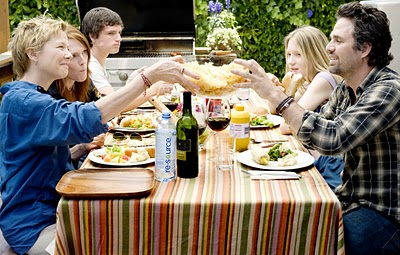You won’t hear a single Who riff in Lisa Cholodenko’s “The Kids are All Right,” but the rock ‘n’ roll title fits nonetheless. As with Cholodenko’s other features “High Art” and “Laurel Canyon,” this is a story of unconventional characters: a lesbian couple, their two teenage children, and their sperm donor; and their musical tastes are just as individualistic.
To capture the sonic world of these two women (played by Annette Bening and Julianne Moore) who wear vintage rock tees to bed and named their daughter Joni, after Ms. Mitchell, Cholodenko worked with music supervisor and KCRW radio host Liza Richardson, whose credits include the iPod Silhouettes commercials and the soundtracks for “Y Tu Mama Tambien” and “Lords of Dogtown.”
Says the director, “Liza and I tried to dig in there and find a mood and a template that echoed where the characters were and who they were, but [we also tried to] find a common ground so that there weren’t sounds that were so disparate in the film.”
The only problem was, they had a budget of around $50,000 – a fairly typical fee for one “big” song. Cholodenko remembers joking with Richardson and saying, “‘Well, then I won’t be asking you for any David Bowie.’ And Liza said, ‘Actually, Bowie’s someone who is very generous and has made it possible to license his music.’”
Hence the three Bowie tunes that are essentially the personal soundtrack for Mark Ruffalo’s Paul, the sperm donor-turned-organic restaurant owner who cruises up on his Triumph motorcycle, accompanied by the fuzzed-out, glammy guitars of “Black Country Rock.”
“When we put in that song,” recalls Cholodenko, “I was just giddy. I was like, that’s staying right there!”
For “the moms,” on the other hand, Richardson says they went for “cool” but age-appropriate choices like jazz, Leon Russell, and, “of course, Joni Mitchell. That was written into the script.”
There’s a pivotal scene in which Bening’s character Nic lets down her guard around the interloping Paul and sings a heartfelt, a cappella version of Mitchell’s “All I Want” at the dinner table. Aware of Mitchell’s reputation for being notoriously picky and saying ‘no’ to every request, Richardson worked to come up with back-up ideas (Fleetwood Mac and Barbra Streisand among them), but Cholodenko wanted Bening to stay focused on one song. Sure enough, Mitchell turned them down, but after they sent her the scene to watch she changed her mind, and even approved the use of her original version on the soundtrack.
“It’s hard to argue with that,” Cholodenko says about Bening’s rendition. “She was absolutely game in terms of who that character was and how that character would do it, kind of weaving the dramatic and the comedic together but giving an earnest homage to Joni. I don’t think anybody could have done it better.”
If Richardson’s main role was to help enhance and elucidate character, Carter Burwell’s spare, guitar-centric score serves to highlight certain plot elements. “I needed him to take things to another level in terms of the dramatic content,” says Cholodenko.
The New York-based composer, best known for his work with the Coen brothers and Spike Jonze, was brought in after the film had been acquired by Focus Features at Sundance, with a temporary score already in place by Cholodenko’s longtime collaborators Nathan Larson and Craig Wedren.
“The timing was such that it got funny,” says the director about the last-minute switch, diplomatically explaining that, with a release date already set, the distributor preferred to go with “a known quantity, which was Carter, who I was a huge fan of.”
For Burwell, the gig presented an opportunity to stretch beyond the quirky, dark projects he’s known for and explore the domestic realm. “I don’t think I’ve ever done a film that you could say was a family film, or a family comedy,” he says.
Of course, Cholodenko hardly ties things up in a bow.
“Part of the fun of this movie is not being sure where it’s headed,” Burwell agrees, noting that there was “a constant back and forth between me and the film and Lisa about how much to say and how much not to say. We tried always to keep it light and spare and keep alive the possibility that things could go in a different way than you expect.”
To that end he brought in two of New York’s finest, bassist John Pattitucci and guitarist Marc Ribot, a virtuosic player who moves easily between the worlds of jazz, Latin and rock music. Burwell himself plays keyboards, and the organic, spacious sounds they create manage to compliment the songs on the soundtrack without veering into cliche (Ribot, for example, plays an acoustic guitar with a magnetic pick-up going through an amp, a la early electric Dylan, because straight acoustic was “almost too much like what you might expect”).
“I felt that the score should seem that it was coming from the same place as [the soundtrack],” Burwell explains.
“All of those songs play as if they’re the musical choices that the characters would have made. I wanted the score to feel the same way, that it’s coming from those people.”
What unfurl as thematic fragments and simple sketches of sounds gradually develop and coalesce throughout the course of the film, until, in the final scene, they come together in an expansive whole. It’s a lovely moment, made even more so by the seamless transition into the MGMT song “The Youth,” with its chiming psychedelic guitars and the opening line, “This is a call to arms, to live and love and sleep together,” which plays over the closing credits.
The song was one that Cholodenko brought to the table, and, like the Bowie track, it just stayed. “Lyrically and sonically it’s a really good punctutation,” she says. “It’s not chirpy, it’s not down; it’s sort of the tone of the film in a way.”



